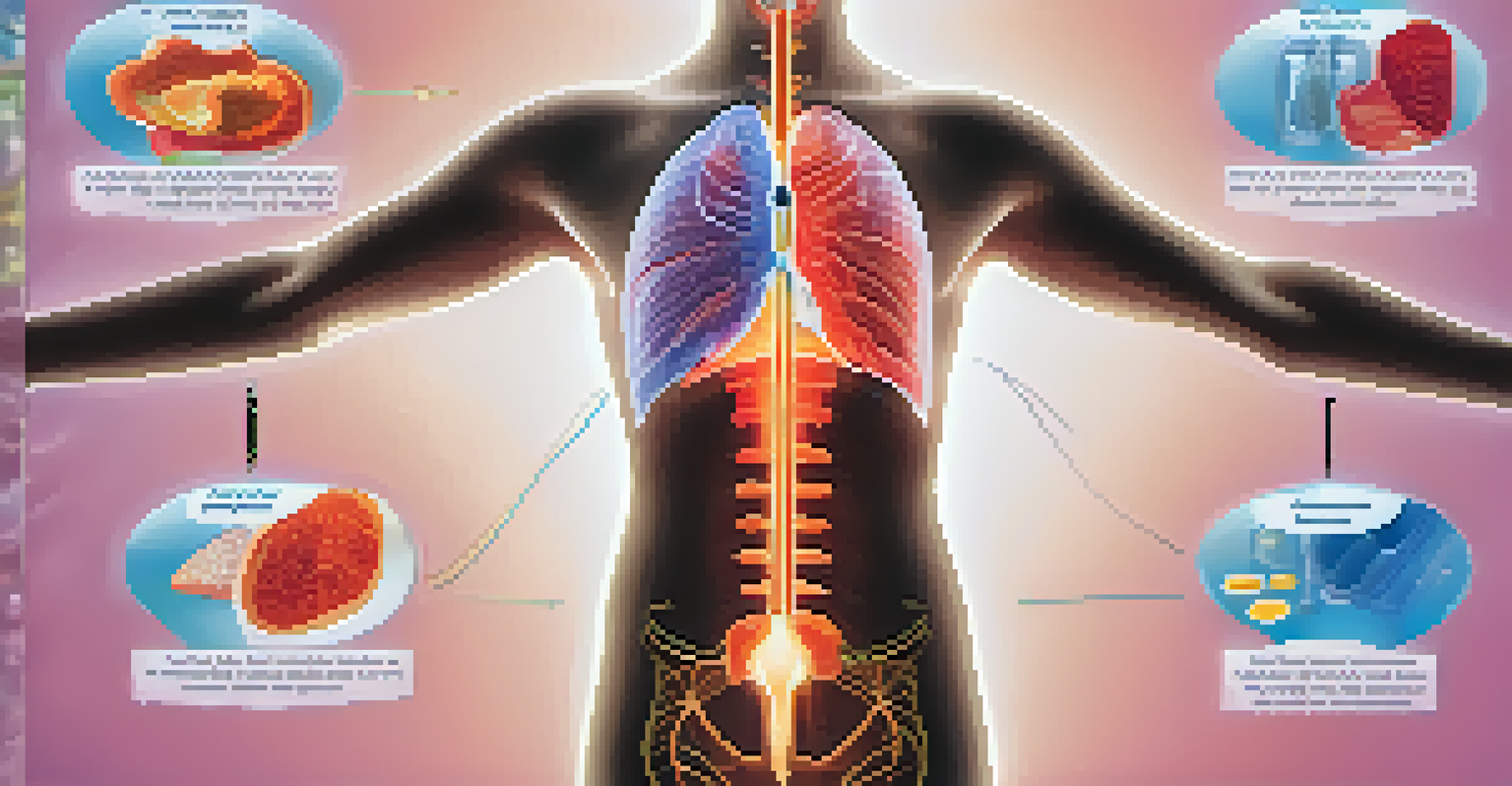The Role of Biomarkers in Evaluating Treatment Outcomes

What Are Biomarkers and Why Are They Important?
Biomarkers are measurable indicators of biological processes or responses. They can be molecules, genes, or even certain physiological changes that provide insights into health conditions. Understanding biomarkers is crucial because they help in diagnosing diseases, predicting outcomes, and tailoring treatment plans to individual patients.
Biomarkers are the bridge between research and clinical practice, enhancing personalized medicine.
For instance, in cancer treatment, specific biomarkers can indicate how a patient might respond to certain therapies. This not only helps in making informed decisions but also minimizes the trial-and-error approach often associated with treatment. Essentially, biomarkers serve as a bridge between research and clinical practice, enhancing personalized medicine.
Moreover, the importance of biomarkers extends beyond treatment selection. They can also be used to monitor disease progression and response to therapies, making them invaluable tools in modern healthcare. This way, both patients and doctors can have a clearer view of what to expect during treatment.
Types of Biomarkers Used in Treatment Evaluation
There are several types of biomarkers, including diagnostic, prognostic, and predictive biomarkers. Diagnostic biomarkers help identify the presence of a disease, while prognostic biomarkers provide information about the likely outcome of the disease. Predictive biomarkers, on the other hand, indicate how well a patient might respond to a specific treatment.

An example of a diagnostic biomarker is the presence of certain proteins in the blood that signal cancer. A prognostic biomarker might reveal how aggressive a cancer is likely to be, guiding treatment intensity. Meanwhile, predictive biomarkers can determine if a patient will benefit from targeted therapies, like those used in breast cancer treatment.
Biomarkers Enhance Personalized Medicine
Biomarkers provide critical insights that allow for tailored treatment plans, improving patient outcomes and minimizing ineffective therapies.
By categorizing biomarkers in this way, healthcare professionals can make more informed decisions tailored to individual patient needs. This classification not only streamlines the treatment process but also enhances the potential for successful outcomes.
Biomarkers in Cancer Treatment: A Case Study
In oncology, biomarkers play a pivotal role in shaping treatment strategies. For example, HER2 is a biomarker in breast cancer that indicates whether the cancer cells have a specific protein that promotes their growth. Patients with HER2-positive breast cancer often benefit from targeted therapies that inhibit this protein, leading to better outcomes.
The future of medicine is personalized, and biomarkers are the keys that unlock this potential.
This case exemplifies how understanding biomarkers can lead to more effective, individualized treatment plans. By testing for HER2, doctors can determine the most effective treatment approach, sparing patients from unnecessary side effects associated with less effective treatments.
Moreover, the use of biomarkers like HER2 has revolutionized breast cancer treatment, resulting in increased survival rates and improved quality of life for many patients. This illustrates the profound impact that biomarkers can have on treatment outcomes.
The Role of Biomarkers in Chronic Disease Management
Biomarkers are not just limited to cancer; they also play a vital role in managing chronic diseases like diabetes and heart disease. For example, HbA1c is a biomarker used to assess long-term blood sugar levels in diabetes patients. Monitoring this biomarker helps healthcare providers adjust treatment plans effectively.
In heart disease, biomarkers such as troponin levels can indicate heart muscle damage. By regularly monitoring these levels, doctors can make timely decisions about interventions, potentially saving lives. This proactive approach demonstrates how biomarkers contribute to better management of chronic conditions.
Types of Biomarkers Improve Evaluation
The classification of biomarkers into diagnostic, prognostic, and predictive types aids healthcare professionals in making informed treatment decisions.
Ultimately, the integration of biomarkers into routine care provides a more comprehensive understanding of a patient's health status. This leads to more timely and appropriate interventions, significantly improving overall treatment outcomes.
Challenges in Implementing Biomarker Testing
Despite their advantages, the implementation of biomarker testing comes with challenges. One significant issue is the variability in biomarker expression among individuals, which can lead to inconsistent results. This variability can complicate the interpretation of test results and affect treatment decisions.
Additionally, access to biomarker testing can be limited by factors such as cost, availability, and healthcare disparities. Not all patients may have the opportunity to receive comprehensive biomarker testing, which can hinder personalized treatment plans. This highlights the need for ongoing efforts to make such tests more accessible.
Furthermore, the rapidly evolving nature of biomarker research means that healthcare providers must stay current with the latest findings. Continuous education and training are essential to ensure that clinicians can effectively utilize biomarkers in their practice, maximizing their benefits for patients.
Future Directions for Biomarker Research
The future of biomarker research looks promising, with ongoing advancements in technology and our understanding of human biology. Innovations in genomic sequencing, for example, are paving the way for the discovery of new biomarkers that could enhance treatment personalization. As we delve deeper into the molecular underpinnings of diseases, the potential for new biomarkers continues to grow.
Moreover, integrating artificial intelligence and machine learning into biomarker research could streamline the identification and validation process. These technologies can analyze vast amounts of data to uncover patterns and associations that might be missed by traditional methods, potentially leading to breakthroughs in treatment strategies.
Future of Biomarkers Is Promising
Advancements in technology and research are expected to unveil new biomarkers, further personalizing healthcare and enhancing treatment strategies.
As research progresses, we can expect biomarkers to play an even more significant role in healthcare. This will not only improve treatment outcomes but also foster a more personalized approach to medicine, ensuring that each patient receives the most effective care tailored to their unique biological makeup.
Conclusion: The Impact of Biomarkers on Treatment Outcomes
In conclusion, biomarkers are invaluable tools in evaluating treatment outcomes across various medical fields. They enable healthcare providers to make informed decisions, tailor treatments to individual patients, and monitor disease progression effectively. The integration of biomarkers into clinical practice has the potential to enhance patient care significantly.
As the understanding of biomarkers continues to evolve, so too will the strategies for utilizing them in treatment. This ongoing development promises to foster more effective, personalized medicine that not only improves survival rates but also enhances the quality of life for patients.

Ultimately, the future of healthcare is bright with biomarkers at the forefront. By embracing this innovative approach, we can look forward to a new era of precision medicine that prioritizes the needs and well-being of each patient.